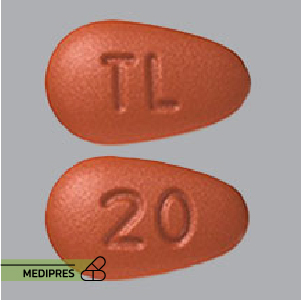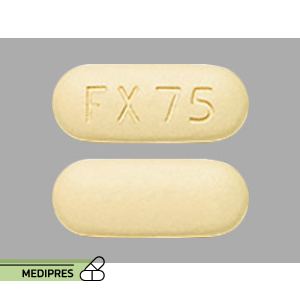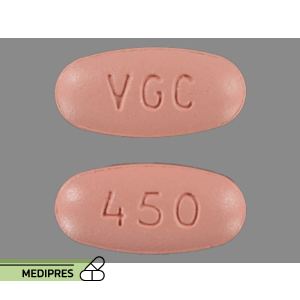
Vitamin E
23 June, 2023
Vraylar
23 June, 2023Vortioxetine
Generic name: Vortioxetine
Drug class: Miscellaneous antidepressants
Dosage forms: Tablet
Root of administration: Oral
Dose: 5, 10, 20 mg
Mechanism of action: Vortioxetine is thought to work by increasing levels of serotonin in the brain, serotonin is a neurotransmitter. Vortioxetine’s mechanism of action (MOA) is thought to be related to the inhibition of the reuptake of serotonin (5-HT), it has other activities, including 5-HT3 receptor antagonism and 5-HT1A receptor agonism.
Drug usage cases: Vortioxetine (Trintellix) is an antidepressant used to treat major depressive disorder (MDD) in adults.
Drug contra indications: You should not use this medicine if you have a hypersensitivity or allergy to vortioxetine. Do not use this medicine if you have used an MAO inhibitor in the past 14 days. After you stop taking vortioxetine, you must wait at least 21 days before you start taking an MAO inhibitor. Tell your doctor if you also take stimulant medicine, opioid medicine, herbal products, or medicine for depression, mental illness, Parkinson’s disease, migraine headaches, serious infections, or prevention of nausea and vomiting. An interaction with vortioxetine could cause a serious condition called serotonin syndrome. To make sure this medicine is safe for you, tell your doctor if you have ever had:
bipolar disorder (manic depression), or a history of drug abuse or suicidal thoughts; glaucoma; seizures or epilepsy; bleeding problems; or low levels of sodium in your blood.
Side effects: Serious vortioxetine side effects: Get emergency medical help if you have signs of an allergic reaction: hives; difficulty breathing; swelling of your face, lips, tongue, or throat. Report any new or worsening symptoms to your doctor, such as mood or behavior changes, anxiety, panic attacks, trouble sleeping, or if you feel impulsive, irritable, agitated, hostile, aggressive, restless, hyperactive (mentally or physically), more depressed, or have thoughts about suicide or hurting yourself. Vortioxetine may cause serious side effects. Call your doctor at once if you have:
racing thoughts, decreased need for sleep, unusual risk-taking behavior, feelings of extreme happiness or sadness, being more talkative than usual; vision changes, eye pain, eye redness or swelling; easy bruising, unusual bleeding, coughing up blood; or low sodium level (may be more likely to occur in older adults–confusion, memory problems, hallucinations, slurred speech, severe weakness, feeling unsteady. Serotonin syndrome is a potentially life-threatening problem that can happen when you take vortioxetine, with an increased risk with certain other medicines. Seek medical attention right away if you have symptoms of serotonin syndrome, such as agitation, hallucinations, fever, sweating, shivering, fast heart rate, muscle stiffness, twitching, loss of coordination, nausea, vomiting, or diarrhea. Vortioxetine can cause side effects of sexual dysfunction.
Warnings: Suicidal Thoughts and Behaviors in Adolescents and Young Adults: Some young people have thoughts about suicide when first taking an antidepressant. Stay alert to changes in your mood or symptoms. Report any new or worsening symptoms to your doctor, such as mood or behavior changes, anxiety, panic attacks, trouble sleeping, or if you feel impulsive, irritable, agitated, hostile, aggressive, restless, hyperactive (mentally or physically), more depressed, or have thoughts about suicide or hurting yourself. Serotonin Syndrome: Increased risk when this medicine is used with other serotonergic agents, but there is also a risk when taken alone. Do not use vortioxetine if you have used an MAO inhibitor in the past 14 days, such as isocarboxazid, methylene blue injection, phenelzine, tranylcypromine, and others. After you stop taking vortioxetine, you must wait at least 21 days before you start taking an MAO inhibitor. Increased Bleeding Risk: Vortioxetine can increase the risk of bleeding events, and using aspirin, nonsteroidal anti-inflammatory drugs, other antiplatelet drugs, warfarin, or other drugs that affect blood clotting may increase that bleeding risk. Discontinuation Syndrome: Adverse reactions after discontinuation of serotonergic antidepressants, particularly after a sudden discontinuation of these medicines. Whenever possible, a gradual reduction in dosage rather than abrupt cessation is recommended. Activation of Mania/Hypomania: There is an increased risk of mania or hypomania in patients who have bipolar disorder, so it is important to screen patients for bipolar disorder, mania, or hypomania before starting treatment with this medicine. Angle Closure Glaucoma: Angle closure glaucoma has occurred in patients with untreated anatomically narrow angles treated with antidepressants. Low blood sodium levels (Hyponatremia): Can occur when taking some types of antidepressants and may be a result of the syndrome of inappropriate antidiuretic hormone secretion (SIADH). Elderly patients may be at greater risk of developing hyponatremia with a serotonergic antidepressant. Also, patients taking diuretics or otherwise volume-depleted can be at greater risk. Sexual Dysfunction: Vortioxetine may cause symptoms of sexual dysfunction in males and females.
Use during pregnancy or breastfeeding: Tell your healthcare provider if you are pregnant or plan to become pregnant, as vortioxetine may harm your unborn baby. Taking this medicine in the last 3 months of pregnancy may cause problems in the newborn, such as withdrawal symptoms, serious lung problems, or other complications in the baby. However, stopping the medicine may not be safe for you. Do not start or stop vortioxetine without asking your doctor. There is a pregnancy registry for females who have taken vortioxetine during pregnancy. The purpose of the registry is to collect information about the health of mothers and their babies who have been exposed to vortioxetine. If you become pregnant during treatment with this medicine. Tell your healthcare provider if you are breastfeeding or plan to breastfeed as it is not known if vortioxetine passes into breastmilk. Discuss with your doctor about the best way to feed your baby while using this medicine.



